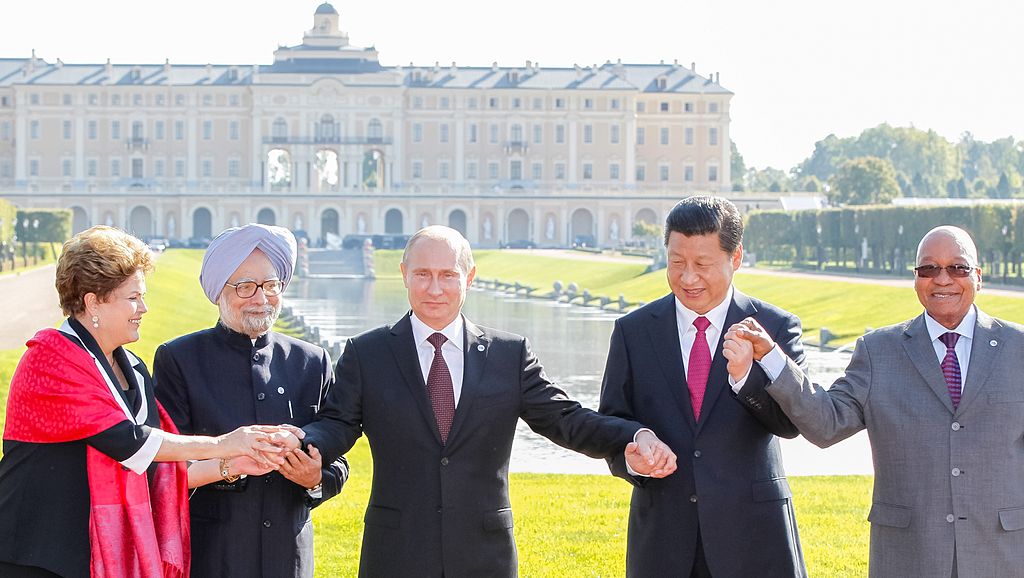Headline
China, Russia leaders’ tours of South America underscore expanding influence in US backyard

BRICS leaders at 2013 G-20 Saint Petersburg summit: Dilma Rousseff, Manmohan Singh, Vladimir Putin, Xi Jinping and Jacob Zuma. Photo by Roberto Stuckert Filho / Agência Brasil / Wikimedia Commons.
BOGOTA, Colombia—It’s enough to make an aging U.S. Cold Warrior shudder.
During overlapping visits to Latin America, the leaders of China and Russia have been welcomed with open arms by governments that are among the most hostile to Washington, including Cuba, Nicaragua and Venezuela. Together with stops in Argentina and Brazil, which both have distanced themselves from the U.S. in recent years, the tours underscore the mix of ideology and economics that’s allowing the two superpowers to expand their influence in America’s backyard.
“These are all countries the U.S. has some real question marks about,” said Kevin Gallagher, a Boston University economist and expert on Chinese-Latin American ties. “It’s going to require some PR so as not to be interpreted in certain, phobic circles as an overt alignment with left-leaning governments at odds with the U.S.”
Both Chinese President Xi Jinping and Russian leader Vladimir Putin said their visits were focused on expanding commercial ties, not taking aim at the U.S. The timing was triggered by a summit Tuesday in Brazil of leaders from the so-called BRICS group—Brazil, Russia, India, China and South Africa.
At the summit, BRICS leaders agreed to create their own development bank worth $100 billion, a move seen as a strong push against the World Bank and the International Monetary Fund, which they perceive as too U.S.-centric.
Prior to arriving at the beach resort of Fortaleza, Putin paid his first visit in more than a decade to Cuba, where he touted a recent decision to wipe clean 90 per cent of the communist-run island’s $35 billion debt to Moscow and announced deals to invest in Cuba’s offshore oil industry. He also made a surprise stop in Nicaragua for a meeting with the country’s president, former guerrilla commander Daniel Ortega, and then signed a deal on nuclear power in Argentina.
Xi also is visiting Cuba and Argentina during his nine-day tour, as well as making a stop in Venezuela, which in recent years has signed loans-for-oil deals valued at more than $50 billion, making it the biggest recipient of Chinese financing in the region.
Of the two visits, Xi’s has sparked the greatest interest. Putin’s outreach seemed driven by a desire to poke at the U.S. in response to what he sees as American meddling on Russia’s doorstep in Ukraine and eastern Europe. China, however, has supplanted the U.S. as the biggest trading partner in country after country.
As China’s economy has soared over the past decade, its thirst for oil, soybeans and iron-ore has been a boon to South America’s commodity producers. Purchases of the region’s goods have surged 20-fold since 2000, according to the Inter-American Development Bank.
China also is interested in being included in a proposal to build a railway that would cross South America, linking ports on Brazil’s Atlantic coast to Pacific ports in Peru.
But as growth in China and Latin America slowed in the wake of the global financial crisis, frictions have emerged, especially in Argentina and Brazil, where manufacturers have started to plea for protection from a flood of cheaper, Chinese-made imports.
“The honeymoon is over and everyone is trying to manage the relationship in ways to maximize the benefits and mitigate the costs,” said Gallagher.
How Xi will exercise China’s increasing leverage remains unclear. During his first visit to Latin America as head of state a year ago, he visited three of the region’s most-open economies—Mexico, Costa Rica and Trinidad & Tobago—in what many outsiders viewed as a nod toward the same free-market policies the U.S. long has endorsed in the region.
But in this second, seemingly more politicized trip, he’s visiting several countries whose policies have driven away investment and are on the brink of crisis. None more so than Argentina, which is locked in a legal battle with U.S. investors to avert a second default in 13 years, and Venezuela, whose economy is being battered by widespread shortages and inflation surpassing 50 per cent.
While both countries are desperate for foreign investment and have abundant oil that China could buy on the cheap, their hopes for a financial rescue may be overblown as Xi isn’t immune to the challenges investors face there, said Dan Restrepo, who served as President Barack Obama’s top Latin American adviser.
“If they can’t attract Chinese investment right now it will really underscore how internationally isolated these countries remain from a financial standpoint,” said Restrepo in a phone interview from Washington.
So far, Xi hasn’t said whether he’ll open his checkbook on the trip or take any swipes at the U.S. like Putin did in Cuba, when he celebrated the rise of a “politically independent, united Latin America” and criticized the half-century U.S. trade “blockade” of the island.
“Bosom friends make distance disappear,” Xi, citing an ancient Chinese poem, said in a written interview with several Latin American newspapers to describe his country’s state of relations with the region.
Whatever he says or does, it will be closely watched in Washington.
“There’s undoubtedly a little anxiety about what might be China’s intentions, capabilities and whether they will create problems for the U.S.,” said Richard Feinberg, a former State Department specialist on Latin America and a senior fellow at the Brookings Institution. “The bottom line is we’re seeing a much more assertive, self-confident China.”





















